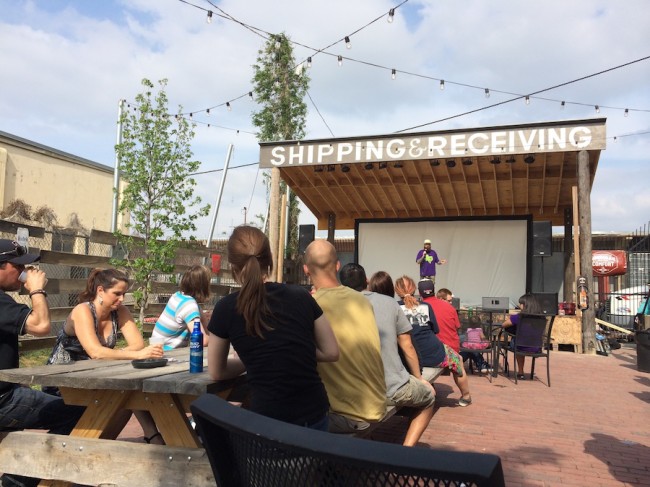
Shaun McAlister, 29, graduated with a college degree in two years and was runner-up for a best portfolio award. He now runs a creative production company out of his home and is the dedicated father of a 10-year-old boy.
He said he’s done it all while smoking pot since he was 17.
“I was a really well-focused college student,” said McAlister, the Executive Director of DFW NORML.
NORML (National Organization for the Reform of Marijuana Laws) is a nationwide effort to legalize weed in America. The DFW chapter is one of the largest in the country, boasting more than 500 members.
The group has had a lot going on in recent months: its first billboard went up on April 8 on Interstate-20 and the organization recently hosted a weekend-long celebration in honor of 4/20, a widely recognized holiday that people observe by smoking weed and celebrating cannabis. The NORML event featured food vendors, glass blowing and local music at Club Dada in Deep Ellum.
The 2014 Global Marijuana March was held in Fort Worth on May 3. The event attracted around 2,000 activists, who ended up on the steps of the Tarrant County Courthouse.
Cannabis has been legalized for recreational use in Colorado and Washington and for medical use only, with various restrictions, in 21 states and D.C. According to a study conducted in February by the University of Texas and the Texas Tribune, 77 percent of Texans would vote against keeping marijuana illegal.
SMU junior Mitchell Presas agrees with the majority. Unlike McAlister, whose approval of cannabis stems from a belief that it benefits users, Presas simply wants less government involvement in Americans’ lives.
“I personally believe that all drugs should be legal,” said Presas. “People should just be responsible for what they do.”
According to Presas, the government’s job is not to keep citizens morally sound, and he believes too much focus is being placed on punishing drug users rather than imprisoning rapists and murderers.
Some Texans, however, remain opposed to any level of cannabis legalization. SMU junior Chint Murdock believes addressing the issue will do more harm than good.
“If it was to be legalized there would obviously be an age limit,” said Murdock, “and creating an age limit would pose more of a challenge than actually getting it, because it’s already so easily accessible.”
NORML as a whole supports the legalization of marijuana for all uses, but some of its members have more specific goals in mind.
Rowlett citizen Dean Bortell, for example, is the father of two girls, one of them an 8-year-old who suffers from general epilepsy. Bortell was one of several speakers at NORML’s monthly meeting on April 26.
He introduced the audience to his daughter and told them about her illness and her struggle with the side effects of the medications prescribed by her doctors. A strand of medical cannabis oil called Charlotte’s Web, however, reduces her seizures without dulling her personality the way pharmaceuticals did. Bortell urged attentive listeners, on behalf of his daughter, to contact officials about the issue.
“There is a strain of a plant out there that can help sick children,” said Bortell, “children who can’t vote, children who can’t call their representatives, children who don’t have a voice. We need to get it into the hands of the sick.”
Fortunately for Bortell and his family, McAlister believes a medical marijuana program could be voted into play as early as 2015.
“People are finally saying, ‘Yes! Now we’ve reached the tipping point. Now I don’t have to be afraid,’” said McAlister.
The group was smaller, about 100, when McAlister became a member in 2011. Six months after he joined, McAlister was asked to take on the position of Executive Director. He had worked at creative organizations before and wanted to run NORML the same way. He focused on attracting high quality talent and consistent, freethinking volunteers.
“We grew into a group that’s actually making things happen,” said McAlister.
For more information and to get involved with DFW NORML, visit the organization’s website.
Claire Kelley is a junior journalism major and English minor. She can be reached at [email protected]










